
The country is facing a historic opportunity to make a breakthrough, with the goal of striving for double-digit economic growth and the aspiration to become a high-income developed country by 2045. Great aspirations require extraordinary actions, but looking directly at reality, institutional and legal "bottlenecks" are still obstacles to development.

Speaking at the opening session of the 8th session of the 15th National Assembly , General Secretary To Lam pointed out the "fatal" bottlenecks of the legal system and requested "immediately removing bottlenecks caused by legal regulations, not allowing these problems to hinder and miss development opportunities for the country".
Realizing that this is an imperative that cannot be delayed, and also an opportunity to open a runway for the country to take off, the National Assembly and the Government have made efforts and devoted all their efforts to this task.
In fact, for many years, overlapping, contradictory, and outdated legal regulations have existed, along with the mindset of “if you can’t manage it, ban it,” which has become an obstacle in the development process. That mindset, along with a cumbersome administrative apparatus, is the “bottleneck of bottlenecks,” missing the “golden opportunity” for the country’s development.
However, the year 2025 has entered Vietnam's legislative history with a revolution in thinking and action. In particular, in the past year, under the leadership of the Party, the National Assembly and the Government have launched an unprecedented large-scale legislative "campaign", with the highest determination to thoroughly remove barriers, while creating a synchronous legal foundation for the reform of streamlining the apparatus and arranging administrative units.
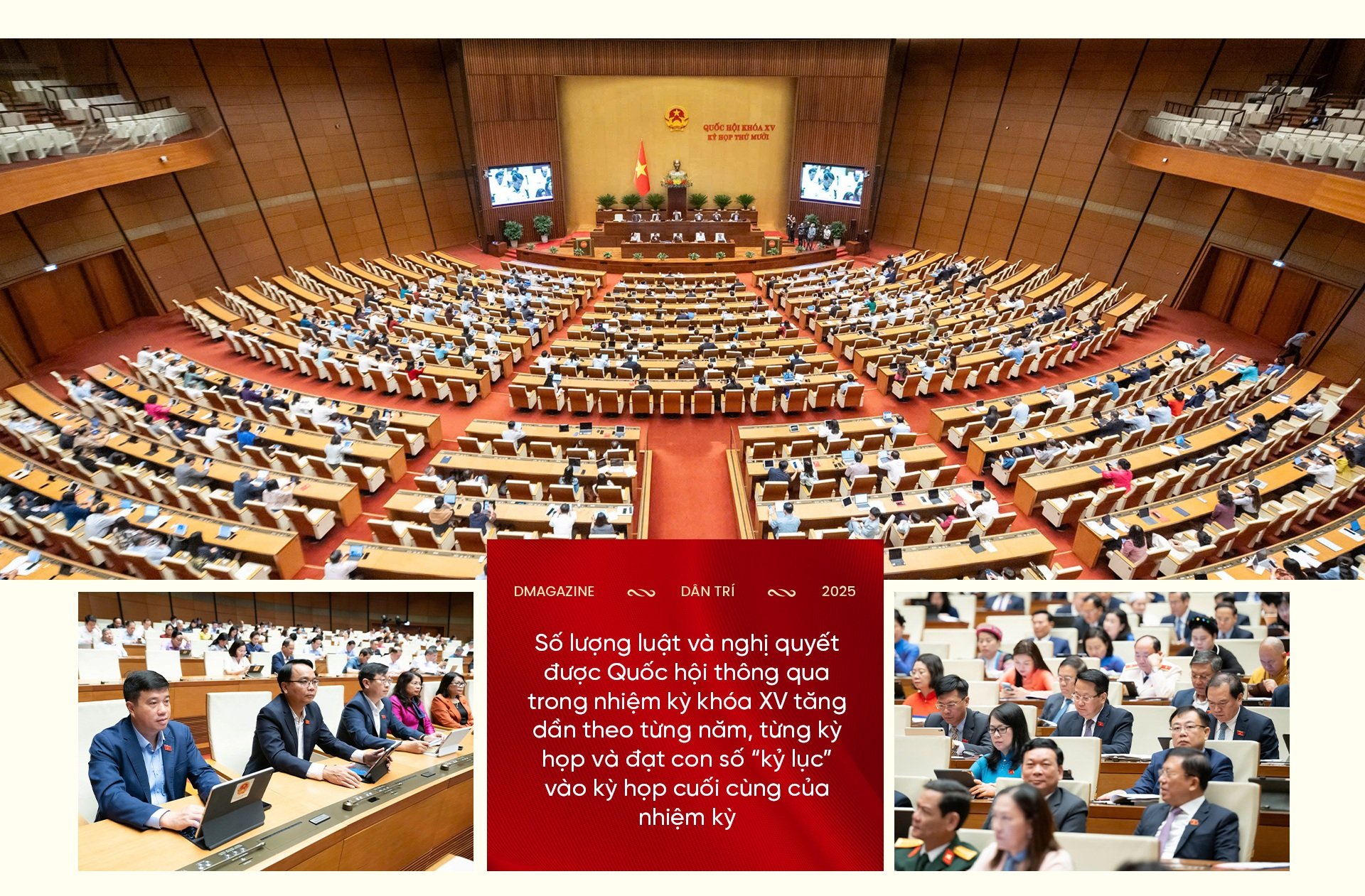
The number of laws and resolutions passed by the National Assembly during the 15th term increased year by year and session by session, reaching a "record" number at the last session of the term.
Accordingly, in 2021, the National Assembly passed 2 laws and 41 resolutions; in 2022, 12 laws and 34 resolutions; in 2023, 16 laws and 34 resolutions were passed. In 2024, the number of laws and resolutions passed was 31 and 60, respectively. In particular, in 2025, the National Assembly is expected to pass a huge number of 87 laws and 66 resolutions.
“The National Assembly must be one step ahead in terms of institutions; must dare to open the way, dare to repair the way, dare to decide on difficult issues, new matters, and unprecedented fields” - that directive of General Secretary To Lam has become the National Assembly's command to act.
Resolution No. 66 of the Politburo on innovation in law-making and enforcement to meet the requirements of national development in the new era, signed and issued by General Secretary To Lam on April 30, also became the "compass" for this institutional reform.
To break the institutional "golden hoop", Resolution 66 proposes fundamental changes, identifying the work of building and enforcing laws as "breakthroughs of breakthroughs". Laws are not only management tools but must become national competitive advantages. Legislative thinking must shift from "management" to "service", and laws "proactively lead development instead of chasing after adjustments".
The most urgent requirement of institutional innovation at that time was to serve the revolution of reorganizing the political system. The merger of provinces and cities, the reorganization of commune-level administrative units and the establishment of a two-level local government required a completely new, synchronous legal framework that had to take effect almost immediately.
The 15th National Assembly has responded to this requirement with consecutive sessions with an intensity and volume of work considered a record in Vietnam's legislative history.
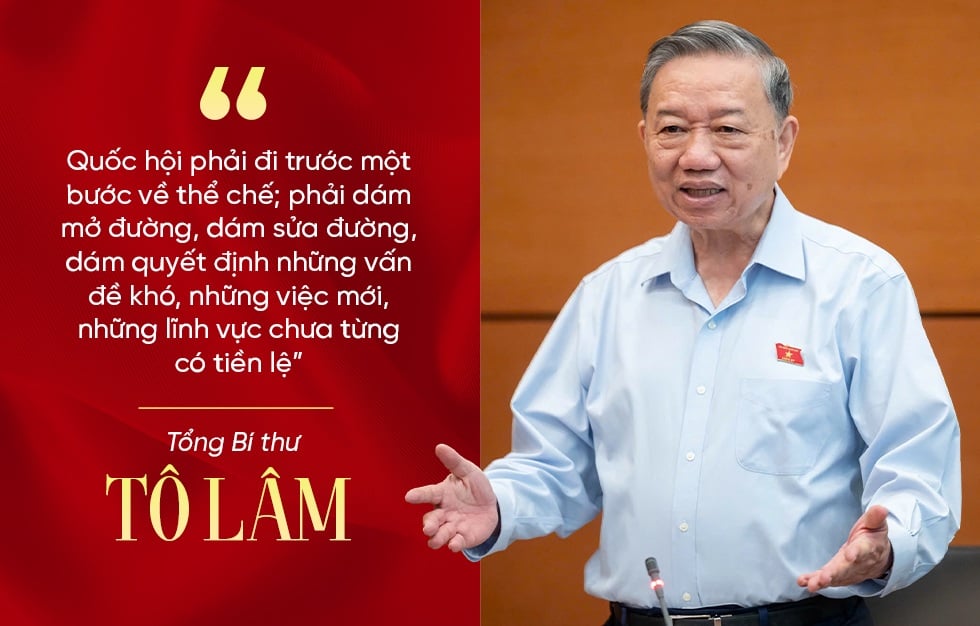
Notably, at the 9th extraordinary session (February), the National Assembly passed many important laws and resolutions related to the organization of the Government and the National Assembly.
Along with that, the National Assembly also passed a Resolution supplementing the 2025 socio-economic development plan with a growth target of 8% or more; a Resolution on piloting a number of special mechanisms and policies to create breakthroughs in science, technology, innovation and national digital transformation; a Resolution on a number of special mechanisms and policies for investment in the construction of the Ninh Thuan Nuclear Power Project...
According to National Assembly Chairman Tran Thanh Man, the laws and resolutions passed have promptly removed institutional difficulties and obstacles, created breakthroughs for development, promoted all resources, and created new development spaces.
Three months later, the 9th session also marked a historic session with the passing of the Resolution amending and supplementing a number of articles of the Constitution with absolute consensus. Amending the Constitution in a session is unprecedented, demonstrating the National Assembly's strong determination to remove institutional bottlenecks.
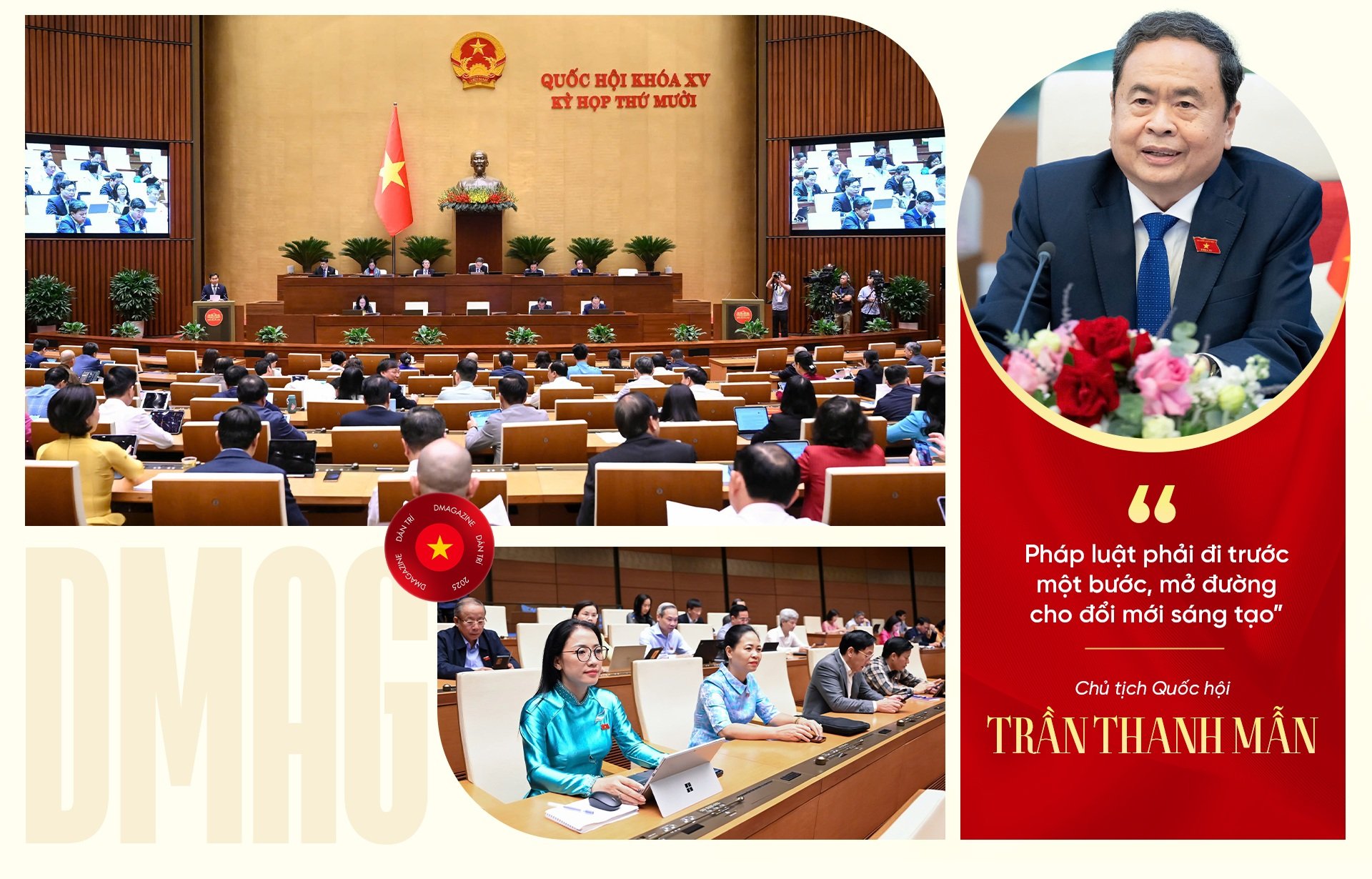
The resolution amending and supplementing the Constitution, along with 34 laws passed at the 9th session, was the largest workload in a session up to that point. This result created a legal basis for the innovation, arrangement of the apparatus and operation of the two-level local government from July 1.
At the 10th session (opening on October 20), the National Assembly continued to break all "legislative records" with a plan to pass 49 laws and 14 resolutions - the largest number at a session in the 80-year history of the National Assembly.
National Assembly Chairman Tran Thanh Man affirmed that this amount of work is "vivid proof of the spirit of the law being one step ahead, paving the way for innovation and creativity."
The laws passed focus on "removing institutional bottlenecks, especially in the fields of land, investment, planning, construction, environment, and energy", directly paving the way for the 5-year Socio-Economic Development Plan 2026-2030 and aiming towards the challenging goal of achieving double-digit growth.
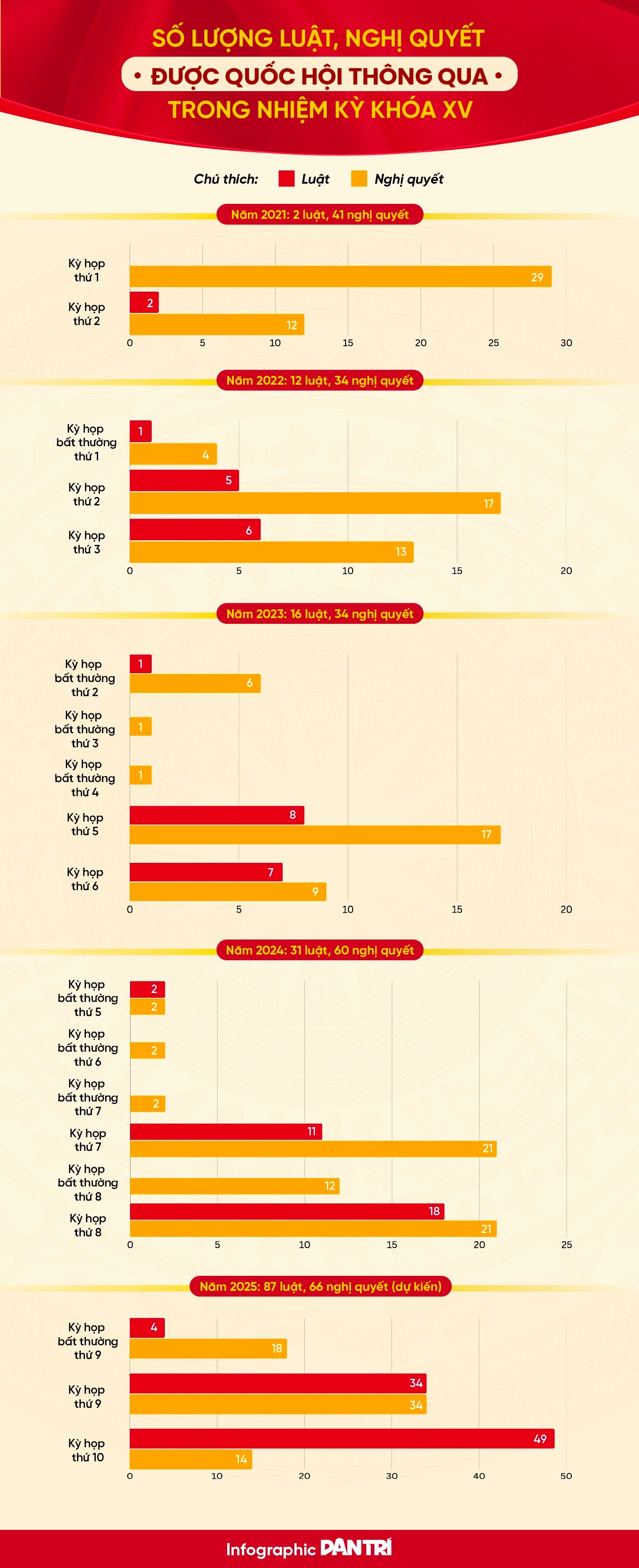

With 15 years of parliamentary activities, National Assembly delegate Ha Sy Dong (former Chairman of the People's Committee of Quang Tri province) shared that "no term has the pressure and intensity of the National Assembly's work been as great as this term".
“Many nights, the National Assembly corridors are always lit up, and the Committees meet one after another. National Assembly delegates have just finished the afternoon session and have to go back to study the documents and prepare the content for the next morning,” said delegate Dong. The working atmosphere is very urgent but also very exciting and responsible, because everyone feels they are contributing to untangling the bottlenecks for the country to develop.
With his experience as a National Assembly delegate for three terms, Mr. Dong clearly realized that the National Assembly today is not only a place to make and discuss laws, but also a place to clear institutions. “Meeting during the day, studying documents at night” is the regular work schedule of National Assembly delegates in each session, according to delegate Ha Sy Dong.
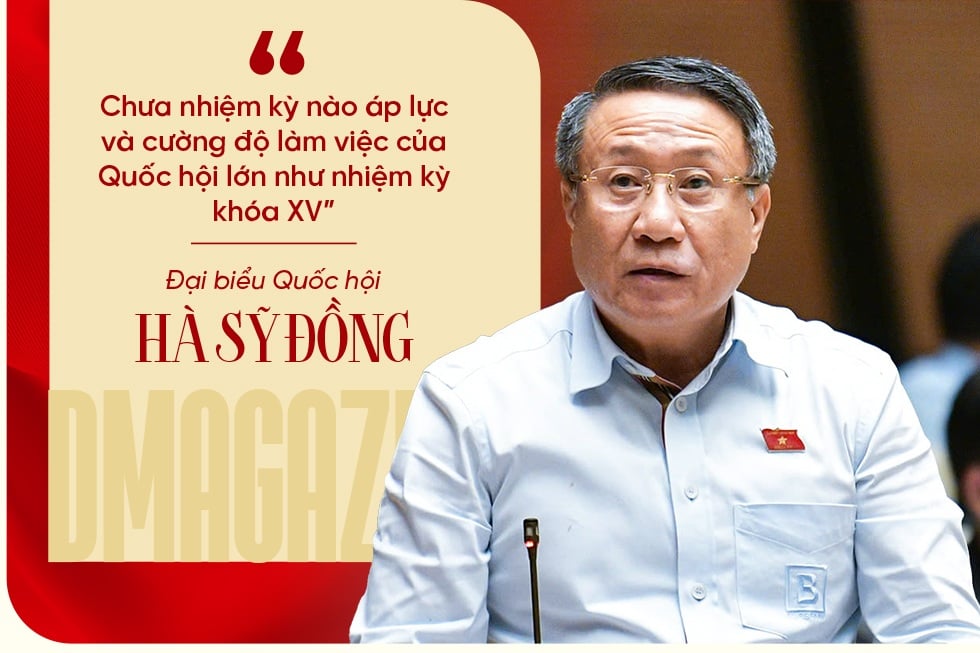
He told the story of 2024, on the morning of January 18, the National Assembly considered and passed the revised Land Law, but at 5:00 p.m. the previous day, the nearly 500-page document was sent to National Assembly delegates.
One night facing a huge set of documents and a series of difficult issues related to planning, land use plans, site clearance compensation, land valuation, land allocation, land lease, etc., forced National Assembly delegates to stay up all night to read and see how opinions from discussion sessions were received and explained before pressing the button to approve.
As a full-time member of the National Assembly working at the Committee on Science, Technology and Environment, Nguyen Ngoc Son also had the opportunity to directly participate in the review process of many important draft laws. What impressed him deeply was the increasing volume of legislative work, its complexity and increasingly high quality requirements.
This reality poses a great difficulty when there is very little time to examine the law. From the time of receiving the dossier to organizing the examination session is often only a few weeks, even a few days.
“Many areas of the Committee are very broad, each draft law requires multidisciplinary understanding, while the number of experts who can provide in-depth support for each area is limited. Many times, delegates have to find documents, synthesize information, and even directly analyze technical reports to ensure that the review content is well-founded,” said delegate Son.
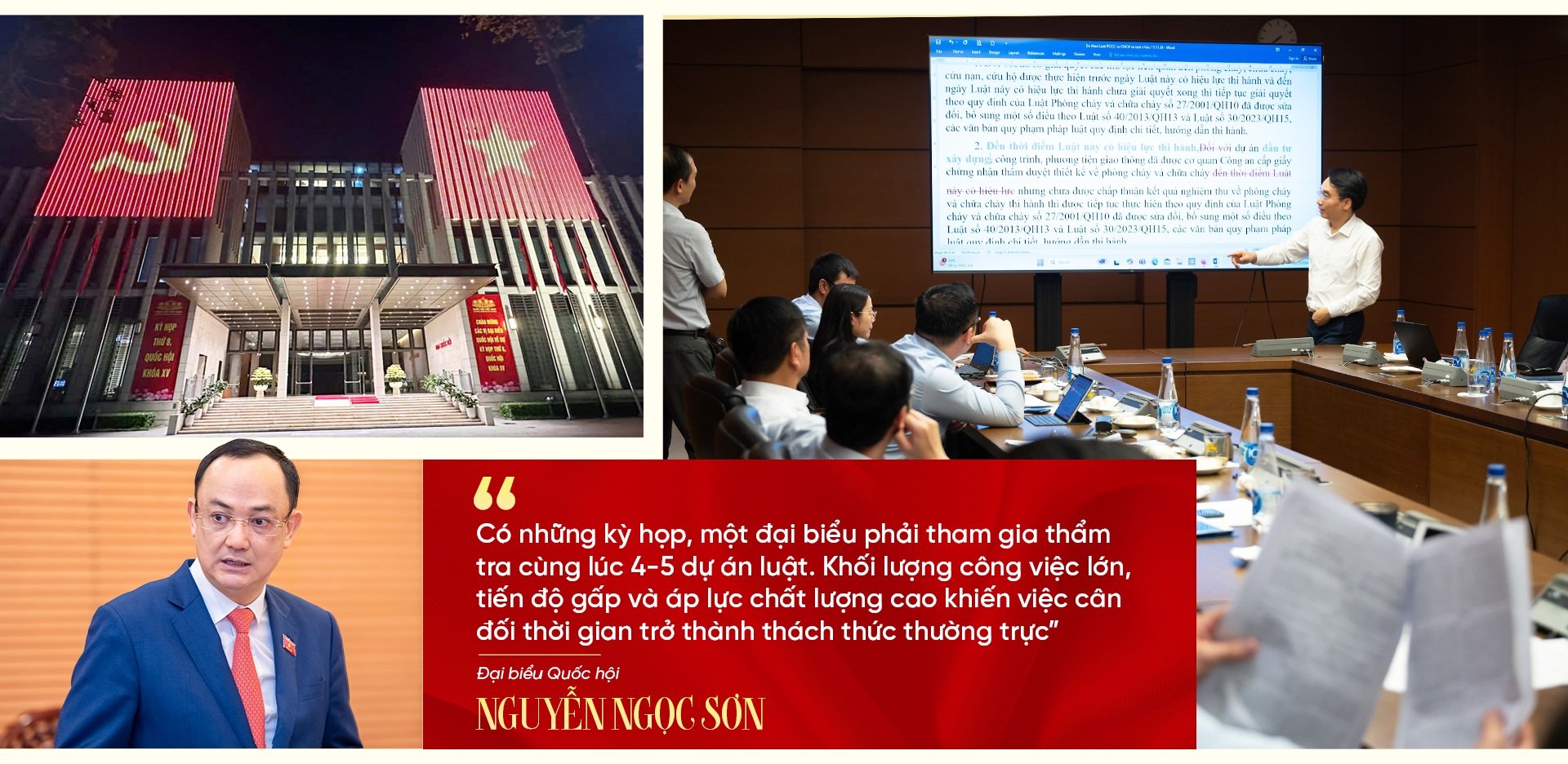
Another pressure is the increasing number of draft laws and resolutions submitted at a session, including many comprehensively amended laws related to many different fields.
Mr. Son said that there are sessions where a delegate has to examine 4-5 draft laws at the same time, while also attending group meetings, delegation meetings, meeting with voters and other activities of the Committee. The large workload, urgent progress requirements and high quality pressure make balancing time a constant challenge.
As an example, he compared the Electricity Law (amended) project to an institutional “sprint”. “There has never been a law project that the Committee had to shorten two working sessions into one, both preliminary examination and official examination within just 20 days. The volume of documents is huge, there are many new policies, while there are dozens of issues that need opinions”, delegate Son said that every night the Committee’s offices are always lit up.
If the Electricity Law is a “race against time”, the Railway Law (amended) is a “complex institutional organization problem”, with up to 23 major policy groups but the Committee only has about 20 working days to complete the review report. “The pressure is huge, but the more we do it, the more we see that each law is not just a technical regulation, but also a commitment to the national development vision”, Mr. Son said.

National Assembly Delegate Trinh Xuan An shared his memories of when he held the role of Standing Member of the National Defense and Security Committee (now the National Defense, Security and Foreign Affairs Committee), the first product he was assigned to chair and advise the Standing Committee of the Review Committee was the Civil Defense Law Project - a very new and difficult law project.
When the draft law was just submitted to the National Assembly Standing Committee, it was stopped because the approach of both the drafting agency and the reviewing agency was not really convincing.
“At that time, I went back to my room and closed the door for a while to calm down and see how to handle it. But in law-making, there is no problem that does not have a solution,” Mr. An said, recounting the meeting at the Ministry of National Defense afterward to continue giving opinions on this draft law. During that meeting, there were conflicting views, even heated arguments, but according to the delegate, that is very normal in law-making.
From there, the lesson learned by delegates in lawmaking is "when you don't know, you have to ask", not being afraid of difficulties, not being afraid of hardship, not being withdrawn, not hiding ignorance and being conservative, and at the same time needing to promote collective intelligence.

With such a spirit of law-making, the Law on Civil Defense was passed by the National Assembly at its 5th session with nearly 95% of National Assembly deputies in favor, and when put into practice, the provisions of the law have proven effective, especially in handling problems when natural disasters such as storms, floods, and droughts occur.
Similarly, when assigned to review the draft Law on National Defense Industry, Security and Industrial Mobilization or the draft Law on State of Emergency, delegate An also learned valuable lessons. In particular, he emphasized the spirit of making laws that must be meticulous, serious and cautious, absolutely avoiding "inserting policies for personal interests".
“I still remember when the Law on National Defense Industry, Security and Industrial Mobilization was passed after two sessions with 100% approval, we hugged each other, bursting with joy after a year of hard work on the law, often even sitting together eating bread at midnight or arguing fiercely in meetings to agree on the most feasible regulation,” Mr. An shared.
According to him, if laws are built with a serious attitude, responsibility, high determination and for the common good, no matter how short the time or how urgent the matter is, the law will still ensure quality and feasibility.
To have good laws, the delegate also emphasized the need for close coordination between Government agencies and the National Assembly. “With so many tasks that require speed, urgency, but are new and complex, if we continue to be slow with the old way of thinking and without close coordination, we will not be able to do it,” said delegate Trinh Xuan An.
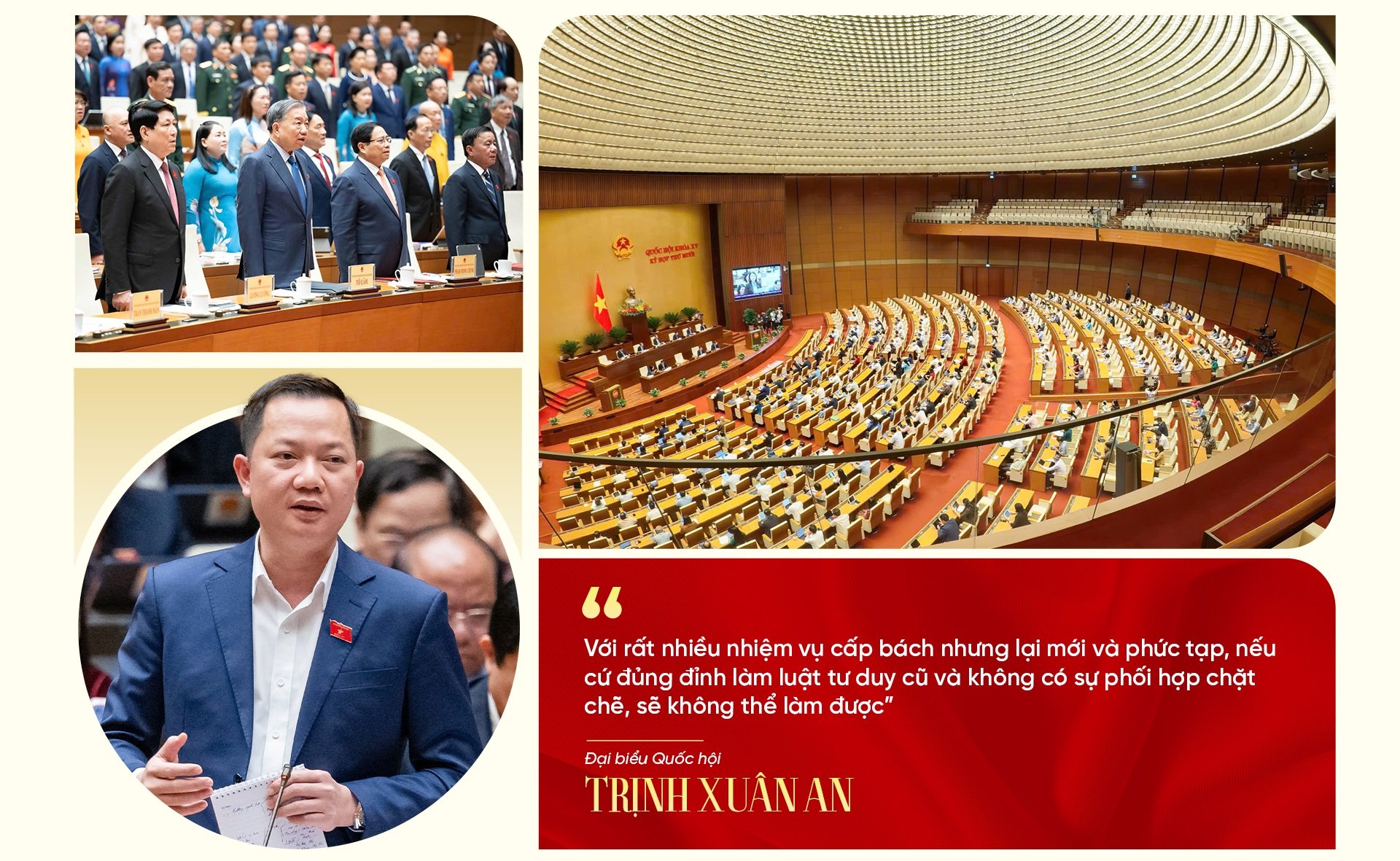
It can be said that the final sessions of the 15th National Assembly's tenure marked a rare milestone in institutional reform. The sleepless nights in the National Assembly's offices proved that institutional reform cannot wait and that laws must always go hand in hand with life. According to the delegates, the passage of the law is not just a push of a button, but also a step to untie the knot for an entire development period.
The sleepless nights with the lights of Dien Hong never turning off left the mark of an active and responsible National Assembly.
Content: Hoai Thu
Design: Tuan Huy
November 3, 2025 - 06:15
Source: https://dantri.com.vn/thoi-su/thuc-te-cap-bach-va-nhung-dem-quoc-hoi-sang-den-khoi-thong-the-che-20251031105744823.htm



![[Photo] Opening of the 14th Conference of the 13th Party Central Committee](https://vphoto.vietnam.vn/thumb/1200x675/vietnam/resource/IMAGE/2025/11/05/1762310995216_a5-bnd-5742-5255-jpg.webp)




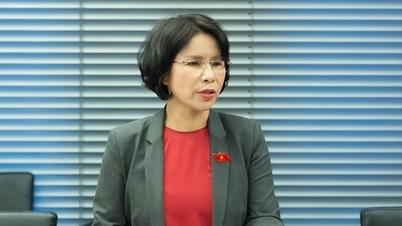





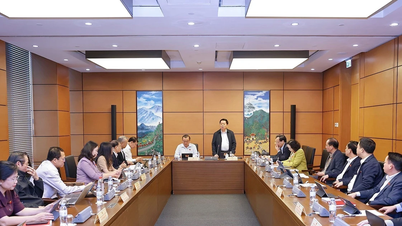

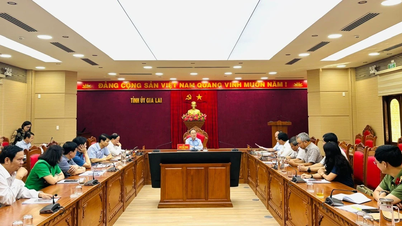


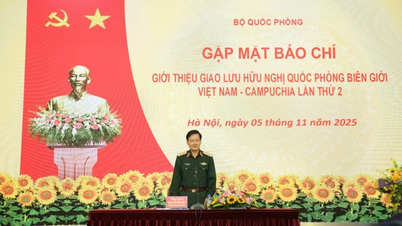

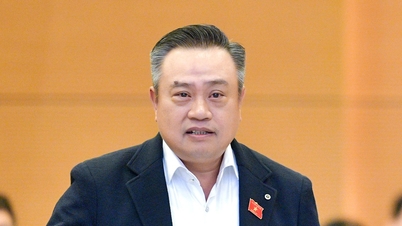



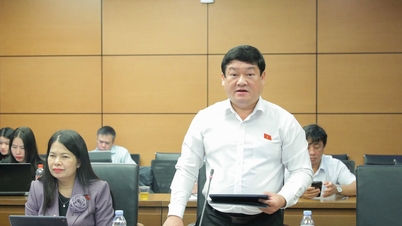

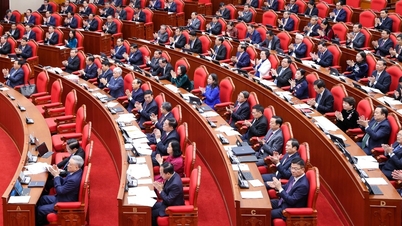












![[Photo] Panorama of the Patriotic Emulation Congress of Nhan Dan Newspaper for the period 2025-2030](https://vphoto.vietnam.vn/thumb/1200x675/vietnam/resource/IMAGE/2025/11/04/1762252775462_ndo_br_dhthiduayeuncbaond-6125-jpg.webp)







































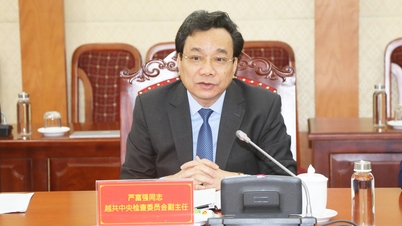

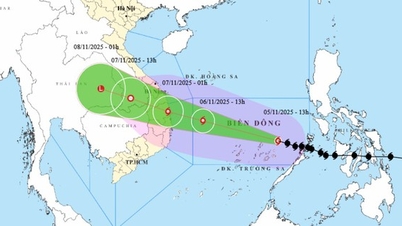






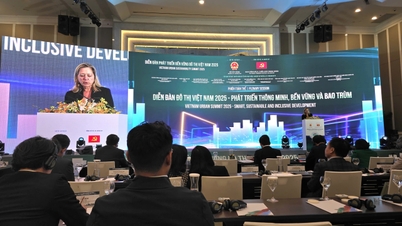



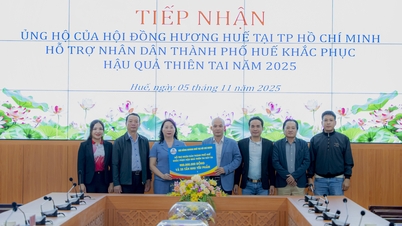


















Comment (0)